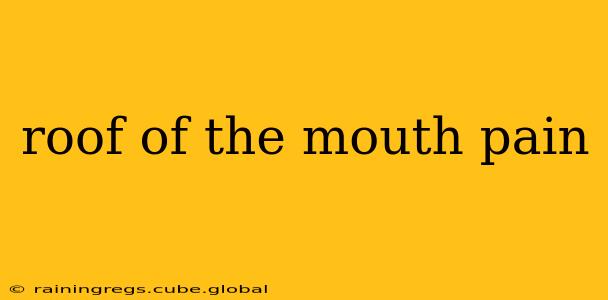Experiencing pain on the roof of your mouth can be incredibly uncomfortable and disruptive to your daily life. This area, medically known as the palate, is sensitive and any discomfort can significantly impact eating, drinking, and even speaking. Understanding the potential causes of this pain is the first step towards finding relief. This comprehensive guide explores various reasons for roof-of-the-mouth pain, associated symptoms, and effective treatment options.
What Causes Pain on the Roof of My Mouth?
The causes of roof-of-the-mouth pain are diverse, ranging from minor irritations to more serious underlying conditions. Let's explore some of the most common culprits:
1. Minor Injuries and Irritation:
- Burns: Hot food or drinks are a frequent cause of palate burns, resulting in immediate and intense pain. This usually heals within a few days.
- Cuts or abrasions: Accidental cuts or scrapes from sharp foods or dental work can cause pain and discomfort.
- Ill-fitting dentures: Dentures that are poorly fitted or too tight can rub against the palate, causing irritation and sores.
- Mouth ulcers (aphthous ulcers): These are small, painful sores that can develop anywhere in the mouth, including the roof. They often heal within a week or two.
- Canker sores: Similar to mouth ulcers, canker sores (aphthous ulcers) are small, painful lesions that appear on the soft tissues of the mouth.
- Trauma: Physical trauma to the palate, such as a blow to the face, can cause pain, swelling, and bruising.
2. Infections:
- Oral thrush (candidiasis): A fungal infection caused by an overgrowth of Candida yeast, often appearing as white patches on the palate and causing burning or pain.
- Viral infections: Some viral infections, like the common cold or herpes simplex virus, can manifest as sores or blisters on the palate.
- Bacterial infections: While less common, bacterial infections can sometimes lead to pain on the roof of the mouth.
3. Medical Conditions:
- Xerostomia (dry mouth): Lack of saliva can lead to dryness and irritation of the palate, making it more susceptible to pain.
- Allergies: Allergic reactions to certain foods or substances can cause inflammation and pain in the mouth, including the palate.
- Lupus: This autoimmune disease can affect various parts of the body, sometimes causing mouth sores and pain.
- Sjogren's Syndrome: This autoimmune disease often leads to dry mouth and eyes, which can contribute to palate discomfort.
4. Other Potential Causes:
- Nicotine pouches: Prolonged use of nicotine pouches can cause irritation and sores on the roof of the mouth.
- Certain medications: Some medications can have a dry mouth as a side effect, increasing the risk of palate irritation.
- Dehydration: Lack of hydration can contribute to dryness and discomfort in the mouth.
What are the Symptoms of Roof of the Mouth Pain?
Symptoms associated with roof-of-the-mouth pain vary depending on the underlying cause. However, common symptoms include:
- Sharp, burning, or throbbing pain: The intensity of pain can range from mild to severe.
- Swelling or inflammation: The affected area may appear red, swollen, or tender to the touch.
- Sores or blisters: These can be small or large, and may be accompanied by bleeding or pus.
- Difficulty swallowing or speaking: Severe pain can make it difficult to eat, drink, or talk comfortably.
- White or red patches: These could indicate an infection like oral thrush.
- Numbness or tingling: In some cases, you might experience a loss of sensation in the area.
How is Pain on the Roof of My Mouth Diagnosed?
A thorough diagnosis typically involves a consultation with a dentist or doctor. They will likely conduct a visual examination of your mouth and ask about your medical history and symptoms. In some cases, further investigations like blood tests or tissue biopsies may be necessary to identify the underlying cause.
How is Roof of the Mouth Pain Treated?
Treatment for roof-of-the-mouth pain depends entirely on the underlying cause. Options may include:
- Over-the-counter pain relievers: For mild pain, ibuprofen or acetaminophen can provide relief.
- Topical pain relievers: Anesthetic gels or sprays can numb the affected area.
- Anti-fungal medications: For oral thrush, antifungal creams or lozenges are prescribed.
- Antiviral medications: For viral infections, antiviral medication may be necessary.
- Prescription mouthwashes: These can help manage pain and inflammation.
- Changes in diet: Avoiding hot or spicy foods can alleviate irritation.
- Improved oral hygiene: Regular brushing and flossing are crucial for preventing infections.
- Adjusting dentures: A dentist can adjust ill-fitting dentures to prevent further irritation.
When Should I See a Doctor?
Seek medical attention if your roof-of-the-mouth pain is severe, persistent, accompanied by fever, or does not improve after a week of home treatment. Also, seek immediate medical attention if you experience difficulty breathing or swallowing.
This information is for general knowledge and does not constitute medical advice. Always consult with a healthcare professional for diagnosis and treatment of any medical condition.
